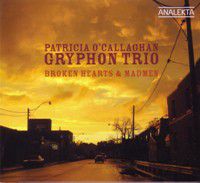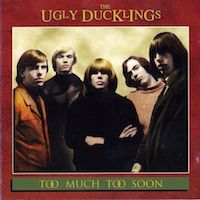Canadian jazz has come a long way from the day that Oscar Peterson made his auspicious debut at New York's Carnegie Hall. The young Montreal pianist, sharing a bill with Charlie Parker, Lester Young and Coleman Hawkins, "stopped the concert dead cold in its tracks," according to down beat magazine, displaying "a flashy right hand, a load of bop and a good sense of harmonic development." Peterson soared to fame virtually overnight, followed a short time later by Montreal trumpeter Maynard Ferguson. For the longest while, they were the only jazz stars from Canada. And, with a distinct lack of domestic gigs, they worked almost exclusively in the United States. Joining Peterson an...
Music journalism, books and more
Canadian pop has clearly come of age. Gone are the days when Canadian musicians had to leave the country to achieve success. Today, our finest, homegrown artists stand shoulder to shoulder with the best in the world, and their records regularly top the international charts. In the 1970s and '80s, Quebec produced several homegrown stars with exceptional voices. Gino Vannelli, a robust singer with a dynamic stage presence, won an ardent following--especially among women. Two other Montreal vocalists scored major breakthroughs: Luba, with her lush, gospel-inflected style, and Corey Hart, with his defiant stance and infamous pout. The late '70s and early '80s saw the rise of Canrock, a genre of ...
In his illuminating memoir, also called Rumours of Glory, Bruce Cockburn writes: “My songs are influenced by what I read, where I travel and what I witness.” He adds: They’re not just about spirituality or “war, injustice and exploitation,” but “derive from life itself.” If life is his inspiration, then Cockburn’s has certainly been rich, judging by the 130 songs in this box set. Written over nearly 50 years, with the earliest recording being 1966’s “Bird Without Wings,” they range from spiritual quests and romantic ballads to prickly protests and engaging travelogues drawn from first-hand experiences on five continents. Together, they form an enlightening audio companion to the memoir. It’s...
It’s not surprising that Gordon Lightfoot’s latest album—the 20th of a long and illustrious career—is also his most reflective. After all, Lightfoot has looked death squarely in the eye, having fought his way back from an abdominal hemorrhage in September 2002 that very nearly killed him. Nothing like a brush with the Grim Reaper to put things in perspective. The songs gathered here revisit many of the themes familiar to fans of Lightfoot’s best work: travel, nature, loneliness and love in all of its many forms. The eerie “Flying Blind” places a northern pilot in peril as he tries to land amid oil rigs, ice caps and polar bears. The stirring “River of Light” conjures up bucolic visions of mi...
Rare is the band that survives the challenges of constant touring, recording and inevitable membership changes. Rarer still is the group that keeps improving, consistently honing its craft and polishing its sound. The Sattalites have achieved that remarkable feat over the course of 30 years, establishing themselves along the way as one of the world's premier reggae acts. Built on the foundational talents of Jo Jo Bennett and Fergus Hambleton, the Sattalites have forged a fresh, vital sound that blends stirring roots reggae with thrilling harmonic pop. This collection represents all sides of the Sattalite sound, from the bubbling joy of "Wild" to the horn-driven ride of "Sunroof." Two can mak...
The Summer of Love gave the world the Monterey Pop Festival and The Beatles’ Sgt. Pepper. Ultimately, those precious months in 1967 produced something far greater: the full flowering of the hippie movement and a sense of cultural, social and political barricades coming down. Change was in the air. The seeds were sown at the Human Be-In in San Francisco’s Golden Gate Park and quickly spread to most major cities in the western world. In Toronto, the May Love-In at Queen’s Park attracted a crowd of barefooted flower children who danced to Buffy Sainte-Marie and Leonard Cohen under a thick cloud of marijuana smoke. That same month, three musicians from Yorkville, Toronto’s hippie village, gather...
 The most adventurous sounds are those that defy restrictive labels and easy categorization. Eclecticism has long been a mainstay of the jazz and pop worlds, where experimentation is encouraged and celebrated. But chamber music, with its roots in specific classical repertoire, has often been limited by advocates intent on simply keeping old traditions alive. Canada’s Gryphon Trio, one of North America’s top chamber ensembles, is committed to changing that.
The most adventurous sounds are those that defy restrictive labels and easy categorization. Eclecticism has long been a mainstay of the jazz and pop worlds, where experimentation is encouraged and celebrated. But chamber music, with its roots in specific classical repertoire, has often been limited by advocates intent on simply keeping old traditions alive. Canada’s Gryphon Trio, one of North America’s top chamber ensembles, is committed to changing that.
Formed in 1993, the Trio—cellist Roman Borys, pianist Jamie Parker and violinist Annalee Patipatanakoon—began pushing the boundaries for chamber music by commissioning and performing new works from both established and emerging composers. Its multimedia production of Christos Hatzis’s Constantinople, took the Gryphons deep into cross-cultural terrain. Set at the crossroads of East and West, Constantinople brought the Trio together with Arabic singer Maryem Hassan Tollar and soprano Patricia O’Callaghan in acclaimed performances across North America and at London’s Royal Opera
Catalysts of the folk boom, Canada’s Ian Tyson and Sylvia Fricker burst onto the scene in the early 1960s with a unique vocal sound. Sold-out concerts at Carnegie Hall. Headline appearances at the Newport and Mariposa festivals. Hit songs like the now-classic “Four Strong Winds” and “You Were On My Mind.” A real singing cowboy and a church organist’s daughter, Ian & Sylvia were one of the hottest acts around. But all of that changed in the mid-1960s when The Beatles and the British Invasion landed on North American shores. The folk boom suddenly went bust and everyone—including Ian’s mentor, a scruffy kid named Bob Dylan—began plugging in. “The Beatles shut us down,” Ian recalled in his ...
It’s the inevitable fate of a multi-faceted artist as ridiculously talented as Paul Quarrington that one creative field should overshadow the others. In Paul’s case, his musical career was rudely hijacked by his literary success. Long before the awards for fiction, humour and screenplays, Paul was a musician—and an extremely good one. He played bass and sang in the eccentric cult-rock band Joe Hall & the Continental Drift, a band his guitarist brother Tony once described as “an acquired taste that no one acquired.” He wrote songs, played guitar and sang with lifelong friend Martin Worthy in the underrated folk duo Quarrington Worthy—even scoring a number one hit in 1980 with “Baby and th...
 On a spring night in 1965, a warm breeze blew along Toronto’s Yorkville Avenue, carrying with it a strange mixture of scents: rich coffee, pungent marijuana and noxious automobile exhaust. Cars crawled along the one-way street between Bay and Avenue Road, past sidewalks filled with teenagers in Beatlecuts and miniskirts. Some sat on café patios, others strolled along the tree-lined boulevard or hung out on doorsteps. Boys watching girls watching boys.
On a spring night in 1965, a warm breeze blew along Toronto’s Yorkville Avenue, carrying with it a strange mixture of scents: rich coffee, pungent marijuana and noxious automobile exhaust. Cars crawled along the one-way street between Bay and Avenue Road, past sidewalks filled with teenagers in Beatlecuts and miniskirts. Some sat on café patios, others strolled along the tree-lined boulevard or hung out on doorsteps. Boys watching girls watching boys.
Like flowers in a hothouse, the musicians in Yorkville thrived on the responses of those who flocked to hear them. There was literally something for everyone: the traditional jazz of Jim McHarg & his Metro Stompers at the Penny Farthing, the delicate ballads of Joni Mitchell at the New Gate of Cleve, the blues folk of John Kay at the Half Beat and the stirring songs of Gordon Lightfoot at the Riverboat.
Meanwhile, the new pop sound had infiltrated the village, with British-influenced bands everywhere: Jack London & the Sparrows at the Café El Patio, Dee & the Yeomen up at the Night Owl and the hard-rocking Ugly Ducklings

